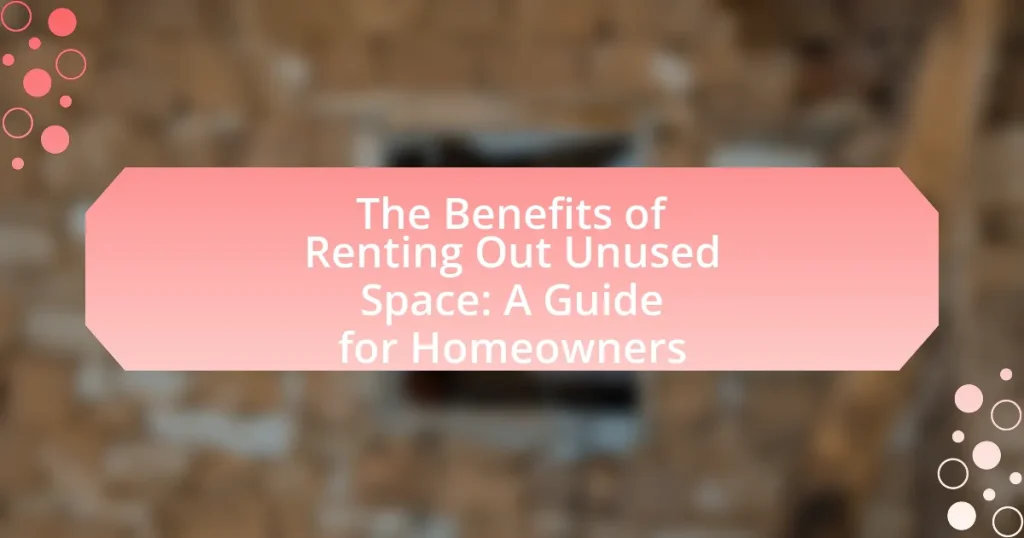The article focuses on the benefits of renting out unused space for homeowners, highlighting how this practice can provide additional income, reduce financial burdens, and enhance property value. It outlines methods for identifying and assessing unused spaces, types of spaces suitable for rental, and the financial advantages of generating rental income. Additionally, the article addresses potential challenges, legal considerations, and best practices for marketing and managing rental spaces effectively. Homeowners are encouraged to maximize their property’s potential while contributing to sustainability by utilizing existing resources.
What are the benefits of renting out unused space for homeowners?

 |
|
Renting out unused space provides homeowners with additional income, which can significantly enhance their financial stability. This income can help cover mortgage payments, property taxes, or maintenance costs, thereby reducing the financial burden on the homeowner. Furthermore, utilizing unused space can increase the overall value of the property, as it demonstrates efficient use of resources and can attract potential buyers in the future. According to a report by the National Association of Realtors, properties that offer rental opportunities tend to sell for higher prices, indicating that homeowners can benefit both financially and in terms of property value by renting out unused space.
How can homeowners identify unused space in their property?
Homeowners can identify unused space in their property by conducting a thorough assessment of all areas, including basements, attics, garages, and spare rooms. This assessment involves measuring each space, evaluating its current use, and determining if it can be repurposed or rented out. According to a survey by the National Association of Realtors, 30% of homeowners have unused rooms that could be transformed into rental spaces, highlighting the potential for additional income.
What types of spaces can be rented out?
Various types of spaces can be rented out, including residential properties, commercial spaces, storage units, event venues, and parking spaces. Residential properties encompass single-family homes, apartments, and vacation rentals, which can generate income for homeowners. Commercial spaces include offices, retail locations, and warehouses, often leased to businesses for operational purposes. Storage units provide individuals and businesses with secure areas to store belongings, while event venues, such as halls or outdoor spaces, can be rented for gatherings and celebrations. Lastly, parking spaces in urban areas are frequently rented out to alleviate parking shortages.
How can homeowners assess the potential of their unused space?
Homeowners can assess the potential of their unused space by evaluating its size, location, accessibility, and condition. By measuring the square footage and considering the layout, homeowners can determine how the space can be utilized, whether for storage, a rental unit, or a workspace. Additionally, analyzing the location in relation to local demand for rentals or storage can provide insights into its marketability. Accessibility, including entry points and parking availability, also plays a crucial role in determining how the space can be effectively used. Finally, assessing the condition of the space, including necessary repairs or renovations, will influence its potential value and usability.
Why should homeowners consider renting out unused space?
Homeowners should consider renting out unused space to generate additional income. This practice can significantly offset mortgage payments or other living expenses, providing financial relief. According to a report by the National Association of Realtors, homeowners who rent out space can earn an average of $1,000 per month, depending on location and type of space. Additionally, utilizing unused areas can enhance property value and maximize the return on investment, making it a practical choice for homeowners looking to improve their financial situation.
What financial benefits can homeowners gain from renting out space?
Homeowners can gain significant financial benefits from renting out space, including additional income, reduced housing costs, and increased property value. By renting out a room or an entire unit, homeowners can generate a steady stream of rental income, which can help cover mortgage payments, property taxes, and maintenance expenses. According to a report by the National Association of Realtors, homeowners who rent out space can earn an average of $1,000 to $2,000 per month, depending on location and property type. Additionally, renting out space can lead to lower overall housing costs, as the income generated can offset monthly expenses. Furthermore, properties that are well-maintained and generate rental income often appreciate in value, providing homeowners with a potential return on investment when they decide to sell.
How does renting out space contribute to sustainability?
Renting out space contributes to sustainability by maximizing the use of existing resources, thereby reducing the need for new construction and minimizing environmental impact. When homeowners rent out unused areas, such as spare rooms or garages, they help decrease the demand for additional housing and commercial spaces, which often require significant energy and materials to build. According to a study by the Urban Land Institute, shared spaces can lead to a 30% reduction in carbon emissions per capita in urban areas, highlighting the positive environmental effects of utilizing existing structures rather than expanding urban sprawl.
What are the potential challenges of renting out unused space?
The potential challenges of renting out unused space include legal issues, property damage, and tenant management difficulties. Legal issues may arise from zoning laws or lease agreements that restrict rental activities, which can lead to fines or legal disputes. Property damage is a risk, as tenants may not treat the space with the same care as the owner, resulting in costly repairs. Additionally, managing tenants can be challenging due to issues such as late payments, disputes, or the need for regular communication, which can be time-consuming and stressful for homeowners.
What legal considerations should homeowners be aware of?
Homeowners should be aware of zoning laws, rental regulations, and liability issues when renting out unused space. Zoning laws dictate how properties can be used, which may restrict short-term rentals or require permits. Rental regulations, including tenant rights and lease agreements, must be adhered to in order to avoid legal disputes. Additionally, homeowners should consider liability insurance to protect against potential claims arising from accidents or damages occurring on their property. Understanding these legal considerations is essential for compliance and risk management in the rental process.
How can homeowners manage tenant relationships effectively?
Homeowners can manage tenant relationships effectively by establishing clear communication and setting expectations from the outset. This involves drafting a comprehensive lease agreement that outlines responsibilities, rules, and procedures for addressing issues. Regular check-ins with tenants can foster a positive relationship, allowing homeowners to address concerns promptly and maintain open lines of communication. Research indicates that effective communication can lead to higher tenant satisfaction and retention rates, as tenants feel valued and understood.
How can homeowners successfully market their unused space for rent?
Homeowners can successfully market their unused space for rent by utilizing online platforms, optimizing their listings with high-quality photos and detailed descriptions, and setting competitive pricing. Online platforms such as Airbnb, Vrbo, and local rental websites provide a broad audience, increasing visibility. High-quality photos attract potential renters, while detailed descriptions highlight unique features and amenities, making the space more appealing. Competitive pricing, informed by market research, ensures that the rental is attractive compared to similar listings, which can lead to quicker bookings. According to a 2021 report by Statista, the vacation rental market is projected to reach $113 billion by 2027, indicating a growing demand for rental spaces.
What platforms are best for listing rental spaces?
The best platforms for listing rental spaces include Airbnb, Vrbo, and Zillow. Airbnb is widely recognized for short-term rentals and has a large user base, making it effective for homeowners looking to rent out unused space. Vrbo specializes in vacation rentals, catering to families and groups, which can maximize occupancy rates. Zillow, on the other hand, is ideal for long-term rentals, providing a comprehensive listing service that attracts a diverse range of tenants. Each platform has unique features that cater to different rental needs, ensuring homeowners can effectively reach their target audience.
How can homeowners create appealing listings for their space?
Homeowners can create appealing listings for their space by using high-quality photographs, writing detailed descriptions, and highlighting unique features. High-quality photographs attract potential renters, as listings with professional images receive 61% more inquiries compared to those with poor-quality images. Detailed descriptions should include information about the space’s size, amenities, and nearby attractions, which helps potential renters envision their stay. Additionally, emphasizing unique features, such as a garden, pool, or proximity to public transport, can make a listing stand out in a competitive market.
What are the best practices for setting rental prices?
The best practices for setting rental prices include conducting thorough market research, analyzing comparable properties, and considering property features and location. Market research helps identify the average rental rates in the area, ensuring competitiveness. Analyzing comparable properties, often referred to as “comps,” allows landlords to gauge what similar spaces are charging, which can inform pricing strategies. Additionally, factors such as property amenities, condition, and proximity to local attractions can justify higher or lower rental prices. According to a report by Zillow, properties priced within 10% of the market average tend to attract more interest and reduce vacancy rates.
How can homeowners determine competitive pricing for their space?
Homeowners can determine competitive pricing for their space by conducting a comparative market analysis (CMA) of similar rental properties in their area. This involves researching local listings on platforms like Zillow or Airbnb to identify the average rental rates for comparable spaces, considering factors such as size, location, amenities, and condition. According to a report by the National Association of Realtors, properties that are priced competitively based on local market data tend to attract more interest and achieve higher occupancy rates.
What factors should be considered when adjusting rental prices?
When adjusting rental prices, factors such as market demand, property location, property condition, and comparable rental rates should be considered. Market demand influences how much tenants are willing to pay; for instance, high demand in urban areas typically leads to higher rental prices. The property’s location affects desirability, with properties near amenities or public transport commanding higher rents. The condition of the property, including maintenance and upgrades, can justify price adjustments; well-maintained properties often attract higher offers. Lastly, analyzing comparable rental rates in the area provides a benchmark for setting competitive prices, ensuring alignment with current market trends.
What tips can homeowners follow to ensure a smooth rental experience?
Homeowners can ensure a smooth rental experience by establishing clear communication with tenants. Effective communication helps set expectations regarding rules, maintenance, and payment schedules, which can prevent misunderstandings. Additionally, conducting thorough tenant screenings, including background and credit checks, can help identify reliable renters, reducing the likelihood of issues during the rental period. Maintaining the property in good condition and addressing repairs promptly also contributes to tenant satisfaction, which can lead to longer rental agreements. According to a study by the National Association of Realtors, properties that are well-maintained attract higher-quality tenants and can command better rental prices.
How can homeowners prepare their space for tenants?
Homeowners can prepare their space for tenants by ensuring the property is clean, well-maintained, and compliant with local rental regulations. This includes performing necessary repairs, deep cleaning the entire space, and addressing safety concerns such as smoke detectors and carbon monoxide alarms. Additionally, homeowners should consider furnishing the space appropriately, providing essential appliances, and ensuring that utilities are functioning properly. According to the National Association of Realtors, properties that are well-prepared for tenants can attract higher rental prices and reduce vacancy rates, demonstrating the importance of thorough preparation.
What common pitfalls should homeowners avoid when renting out space?
Homeowners should avoid underestimating costs when renting out space, as this can lead to financial strain. Many homeowners fail to account for expenses such as maintenance, utilities, and property management fees, which can significantly reduce profit margins. Additionally, neglecting to screen tenants properly can result in problematic rentals, leading to potential damage or late payments. According to a survey by the National Association of Realtors, 30% of landlords reported issues with tenant screening, highlighting the importance of thorough background checks. Lastly, homeowners often overlook local regulations and zoning laws, which can result in fines or legal issues if not adhered to.


